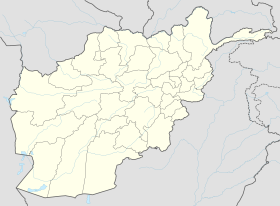
The Islamic State of Iraq and the Levant – Khorasan Province is a branch of the militant Islamist group Islamic State of Iraq and the Levant (ISIL) active in South Asia and Central Asia. Some media sources also use the terms ISK, ISISK, IS-KP, ISIS-K, or Daesh-Khorasan in referring to the group. The Khorasan group's main activity is in the border region of eastern Afghanistan and northern Pakistan, but its area of operations also includes other parts such as Tajikistan, and India where individuals have pledged allegiance to it.

On 31 May 2017, a truck bomb exploded in a crowded intersection in Kabul, Afghanistan, near the German embassy at about 08:25 local time during rush hour, killing over 150 and injuring 413, mostly civilians, and damaging several buildings in the embassy. The attack was the deadliest terror attack to take place in Kabul. The diplomatic quarter—in which the attack took place—is one of the most heavily fortified areas in the city, with 3-meter-tall (10 ft) blast walls, and access requires passing through several checkpoints. The explosion created a crater about 4.5 m (15 ft) wide and 3–4 m (10–13 ft) deep. Afghanistan's intelligence agency NDS claimed that the blast was planned by the Haqqani Network. Although no group has claimed responsibility, the Afghan Taliban are also a suspect but they have denied involvement and condemned the attack.
On 30 April 2018, two suicide bombers detonated near government buildings in central Kabul, Afghanistan, killing at least 29 people and injuring 50.

On 1 July 2019, a combined gun and bomb attack took place in the Wazir Akbar Khan neighborhood of Kabul, Afghanistan. The attackers initially detonated a bomb-laden truck, after which five gunmen entered a nearby building under construction and fired on Afghan security personnel evacuating people onto the street. At least forty-five were killed, including the five attackers. The spokesman for the Afghan Ministry of Public Health, Wahidullah Mayar, said that 116 civilians, including 26 children and 5 women, were wounded. The Taliban claimed the responsibility for the bomb attack in Kabul and said although civilians were not the Taliban target, some were injured.
Events from the year 2020 in Afghanistan.

In May 2020, a series of insurgent attacks took place in Afghanistan, starting when the Taliban killed 20 Afghan soldiers and wounded 29 others in Zari, Balkh and Grishk, Helmand on 1 and 3 May, respectively. On 12 May, a hospital's maternity ward in Kabul and a funeral in Kuz Kunar (Khewa), Nangarhar were attacked, resulting in the deaths of 56 people and injuries of 148 others, including newborn babies, mothers, nurses, and mourners. ISIL–KP claimed responsibility for the funeral bombing, but no insurgent group claimed responsibility for the hospital shooting.
The August 2020 Afghanistan attacks were multiple attacks that occurred in August 2020. The attacks left at least 165 people dead, and another 177 were injured.
The September 2020 Afghanistan attacks were multiple attacks that occurred in September 2020. The attacks left at least 105 people dead and another 112 injured. 97 insurgents were also killed and another 58 were injured in these attacks.
The October 2020 Afghanistan attacks were multiple attacks launched by insurgents including the Taliban and Islamic State of Iraq and the Levant – Khorasan Province in October 2020. The attacks left at least 243 people dead and another 339 were injured. 10 perpetrators were also killed in these attacks.
The November 2020 Afghanistan attacks were multiple attacks launched by insurgents including the Taliban and Islamic State of Iraq and the Levant – Khorasan Province in November 2020. The attacks left at least 88 people dead and more than 193 injured.

On 8 May 2021, a car bombing, followed by two more improvised explosive device (IED) blasts, occurred in front of Sayed al-Shuhada school in Dashte Barchi, a predominantly Shia Hazara area in western Kabul, Afghanistan, leaving at least 85 people dead and 147 injured. The majority of the casualties were girls between 11 and 15 years old. The attack took place in a neighborhood that has frequently been attacked by militants belonging to the regional Islamic State of Iraq and the Levant – Khorasan Province (ISIL) over the years.
The June 2021 Kabul bombings were two bomb attacks against buses in Kabul, Afghanistan. The attacks left at least 10 people dead and another 12 were injured. The attacks took place in a mostly Hazara area of Kabul. Hazaras have previously been targeted by ISIL. On June 2, ISIL claimed responsibility for the attack via telegram.
Uprising for Change is an Afghan civil disobedience movement that started with tent sit-ins in central Kabul in June 2017 in response to the 31 May 2017 Kabul bombing, the killing of protestors by Afghan security forces on 2 June, the 3 June suicide bombings at a funeral of one of the 2 June victims, and subsequent police violence. On 11 June 2017, the commander of the Kabul Garrison, Ahmadzai, and Kabul police chief Hassan Shah Frogh were suspended from duty following the protests. In March 2018, Uprising for Change called for the Afghan government to be replaced by a six-month interim government.





